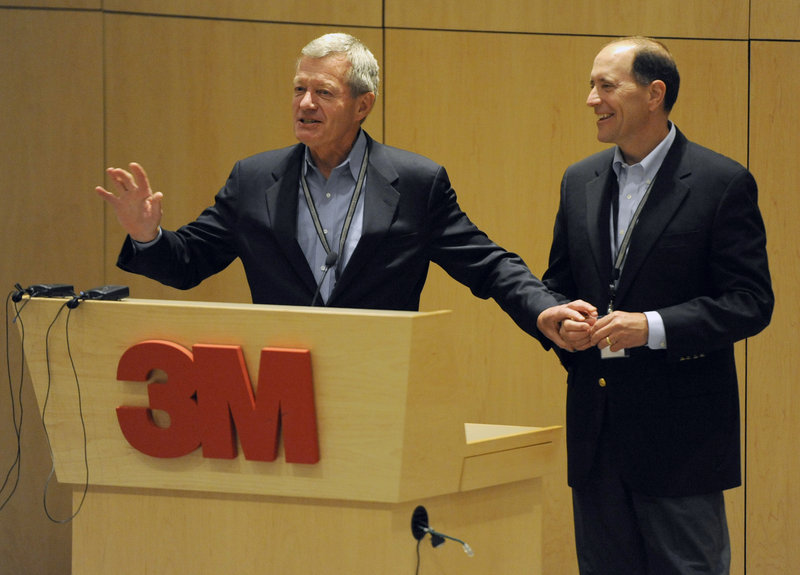ST. PAUL, Minn. – Welcome to the “Max and Dave Show,” a campaign-style swing around the country featuring two of the most powerful members of Congress rallying support for their effort to overhaul the nation’s tax laws — and, just maybe, change the way Washington works.
Sen. Max Baucus, a Democrat from Montana, and Rep. Dave Camp, a Republican from Michigan, are Washington’s newest power couple — and an odd one during these politically deadlocked days in Washington. They are lawmakers from different states, different parties and they’re a decade in age apart. Yet, Camp and Baucus are developing a close friendship as they try to rally other lawmakers to their cause.
“Dave’s my buddy,” Baucus told a gathering of workers at 3M, the Minnesota-based maker of everything from Scotch tape to electronic touch screens. “My comrade.”
These days, you don’t often hear Democrats talk that way about Republicans, or see campaign-style events for a topic as dry as tax reform. But the pair have a common goal for an overhaul they believe is long overdue. And tax policy, to them, is exciting for all that is wrong and could be improved about it. So beginning last week in Minnesota, Baucus and Camp began barnstorming the country, employing a similar burgers-and-beer strategy that’s worked for them with colleagues in Washington.
“You have to have some basis to deal with each other to work together,” Camp said in an interview. “What we’re trying to do is create that foundation so that we are going to be able to work together on a very important bill that could have profound beneficial effects for the country.”
At issue is a tax system that many inside and outside of Congress say is too complicated for individuals and too onerous for businesses. The broad goal of tax reform is to simplify the code by eliminating or reducing tax breaks and using the additional revenue to lower tax rates for everyone.
Lawmakers in both political parties are convinced that simpler, easier-to-understand tax laws would spur economic activity. One problem is that many of the biggest tax breaks, including those for owning a home or contributing to retirement plans, are very popular.
And there are significant differences among Democrats and Republicans over how much tax revenue the government should raise and who should pay it. Democrats generally want reform to generate more revenue; most Republicans in Congress are opposed to raising taxes.
Camp and Baucus also are working in a toxic partisan environment in Washington that makes it difficult for Congress to pass routine legislation, let alone a monumental package like tax reform.
“I don’t see how we get anywhere, candidly,” said Senate Republican leader Mitch McConnell, who is up for re-election in Kentucky next year.
Senate Majority Leader Harry Reid wasn’t much more optimistic. “We’re a long way from getting something on paper as to what we’re going to go forward on,” Reid said.
Still, Baucus and Camp are pressing forward.
Every few weeks, Baucus and Camp invite about a dozen lawmakers to lunch at a Capitol Hill pub, always a mix of Democrats and Republicans, senators and House members.
Camp and Baucus have held two lunches so far. The latest was Tuesday, and Rep. Lynn Jenkins, R-Kansas, was there. She said Camp and Baucus are setting a good example for other lawmakers.
“There was a time when members of Congress moved their families to Washington, and they got to know each other. Their kids went to school together, they went to church together, they socialized together,” Jenkins said. “We don’t do that anymore. Our constituents demand that we be in church with them on Sunday.”
Camp says he is committed to passing a tax reform bill out of the Ways and Means Committee by the end of the year. There is no guarantee the full House would vote on a bill. But Speaker John Boehner has signaled his support for the effort by reserving the prestigious bill number HR 1 for a tax overhaul measure.
In the Senate, Baucus is teaming with Sen. Orrin Hatch of Utah, the top Republican on the Senate Finance Committee, to write a new tax code, almost from scratch. Instead of trying to figure out which tax breaks to scrap, Baucus and Hatch are starting with a blank slate and inviting other senators to make the case for restoring various deductions, credits and exemptions.
Send questions/comments to the editors.


